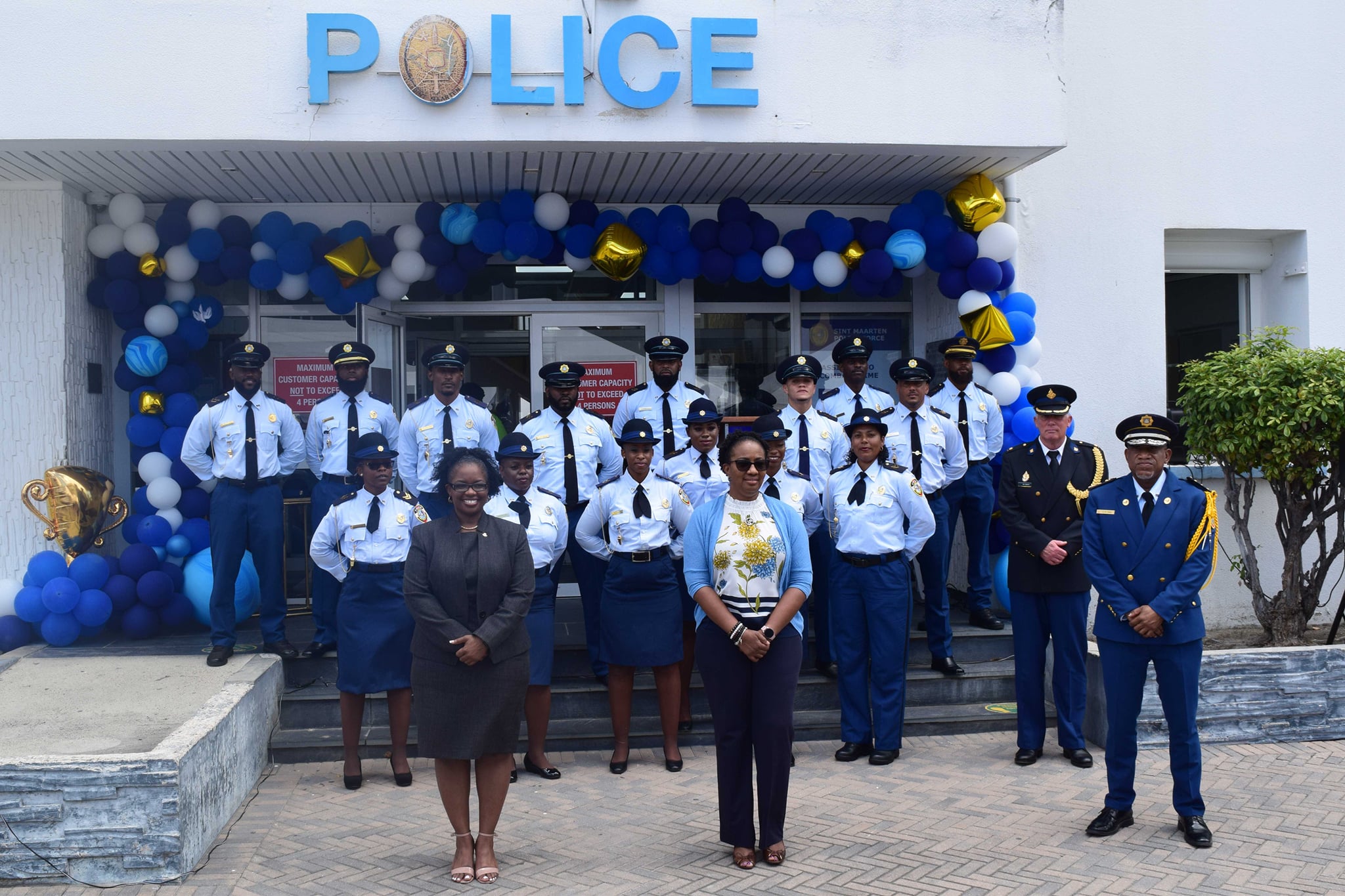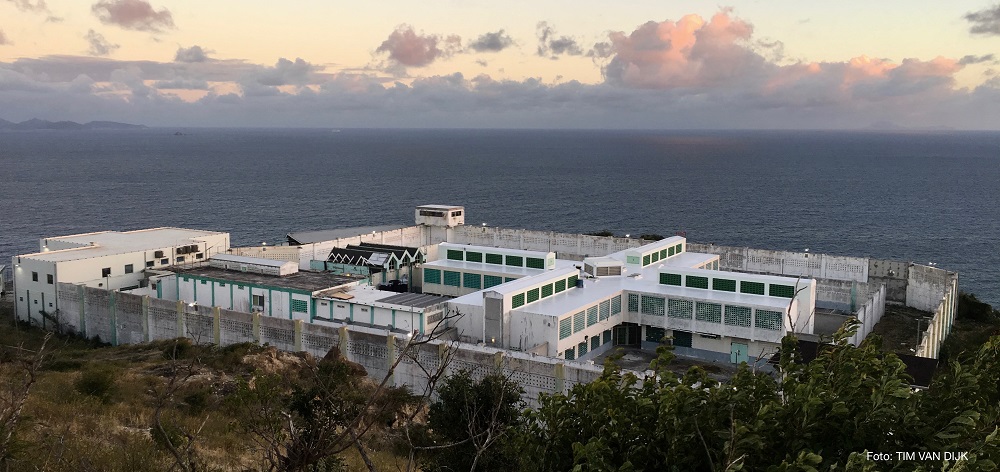Is function book saga finally coming to an end?

PHILIPSBURG — State Secretary Raymond Knops spoke during his visit to St. Maarten with Justice Minister Anna Richardson and Prime Minister Silveria Jacobs about the worrisome situation at the police force and the Pointe Blanche prison. Knops’ report to the Second Chamber about his trip suggests that Minister Richardson withheld information during their meeting.
Knops writes in the report about his visit to the Caribbean that ended on May 21 in Sint Maarten: “The function book for the police force has not been established yet.”
Two days after the end of his visit, Minister Richardson published a press release, announcing that the very same function book is almost complete. The Council of Ministers approved the function book on May 11 and on May 21 the ministry sent it via the Governor to the Council of Advice. Based on the state secretary’s report, it seems that he was not made aware of this development during his meeting with Richardson and Jacobs.
The minister’s press release radiated a level of optimism that Knops would have appreciated: “I am confident with the draft as it currently stands and trust that the next steps of the process shall be smooth, hopefully with minimal to no changes needed after the review by the Council of Advice.”
Advises from the Council of Advice are not binding. It usually publishes its findings within six weeks after receiving a request for advice. In the case of the function books, this publication can therefore be expected before July 2.
Knops also referred in his report to the Progress Committee. Established in 2010 when St. Maarten became an autonomous country in the Kingdom, this Committee has in the meantime published an astonishing forty reports about the state of the Plans of Approach for the police force and the Pointe Blanche prison. All these reports have one thing in common: a disastrous lack of progress.
While the fortieth report from the Progress Committee has not been made public yet, the 39th report offers insight in the problems both the police force and the prison have been dealing with for the past ten-plus years.
The Committee notes that the plans of approach were a condition for obtaining country status in 2010 and that the plans were ratified in September 2010.
Plans and function books for the police force and the prison were available in 2010, ready to be formalized. That did not happen: “Successive ministers have proposed amendments,” the Progress Committee remarks about the delays, adding that it advised Ministers of Justice in 2015 and in 2019 about these issues.
The basis on which the police force currently works still has not been formalized, the Progress Committee notes in its report. “That is not the fault of the police force, but because none of the successive ministers of justice has formalized the necessary documents.”
Based on her press release, Justice Minister Richardson is about to change this.
The police force has to deal with structural staff shortages, the Progress Committee notes. How bad this really is, appears from the figures that are included in the progress report.
The original plan, back in 2010, was to staff the police force with 394 ftes (full time equivalents). Ten years later, in 2020, there were only 216 ftes, just 54.8 percent of the original objective. For 2021 the Progress Committee expects the staff to grow to 245 ftes (62.2 percent) and in 2022 to 265 (67.2 percent). The real figures will be lower, because on average 6 people per year leave the force for a variety of reasons. In 2022 the force will therefore at best have 253 ftes; that’s 64.2 percent of the staffing it should have.
“To achieve the required minimal strength (75 percent of executive police officers) an additional fifty staff members are needed,” the Progress Committee writes. A growth-plan has to be based on these numbers and the Committee has asked the Minister of Justice to present such a plan.
For now, all this remains wishful thinking. “A strength that can guarantee the safety on the island is still far away. Justice ought to focus on increasing public safety and measures to achieve this have to be taken.”
The Progress Committee advises to begin with the recruiting of personnel as soon as possible. That is the only way to cut down on overtime for the existing staff.
The question remains however whether the staffing that was foreseen in 2010 will even be sufficient. “It was established in cooperation with the police force Rotterdam/Rijnmond, based on the insights of that time. In the meantime, many developments have increased the workload for the police.” The committee refers in this context to population growth, hurricanes, increased tourism and the COVID-19 pandemic.

The situation at the prison is not much better, although the Progress Committee is content that there is perspective for the execution of the Plan of Approach Detention Plan St. Maarten. The country package St. Maarten signed on to in December 2020, contains a €20 million ($24.4 million) contribution from the Dutch government for the construction of a new prison and another €10 million ($12.2 million) for solving other bottlenecks in the justice chain.
Staff shortages are among those bottlenecks. The Progress Committee found that there are currently 96 staffers available for the Pointe Blanche prison, the Miss Lalie Center and for guards at the police station.
Pointe Blanche has 48 employees on the payroll, but 13 of them are out long-term due to illness or disabilities. “Only forty percent is available for guarding 70 inmates.”
This has consequences for both inmates and guards: “There is no or hardly any space for day-activities for the inmates. This understaffing also represents serious safety risks for staff and inmates.”
The process of recruiting additional staff has come to a complete standstill. The Committee has advised the minister to restart the recruitment process as soon as possible “to maintain at least the minimum staffing for the shift work.”
The progress committee repeats its advice to hire a program manager for the execution of the Detention Plan and to provide information about the housing of the central dispatch room, the shooting range and class rooms.
Originally these facilities were to be housed in the former Soremar building in Cole Bay, but the building was damaged during Hurricane Irma in 2017.
The Soremar building has been standing idle and forlorn for almost five years. On March 29, 2016, Edson Kirindongo, then minister of justice, signed the purchase agreement for the building. On July 29 Kirindongo cut the blue ribbon to open the (still empty) building during a festive event staged just before the parliamentary elections of September 26.
In its 37th report, the Progress Committee wrote that a plan was sent to Minister Richardson to remodel the building and turn it into a multifunctional center. According to the plan, the Soremar building was to become the home of a joint dispatch room, the control room for camera surveillance, the police school and a forensic laboratory. Also included were three classrooms, including a dojo – a facility for training in various arts of self-defense. The building would also have a storage facility for confiscated items and a digital shooting gallery.
The plan was at the time waiting for approval by the Council of Ministers. Until now, that approval is still pending.


























